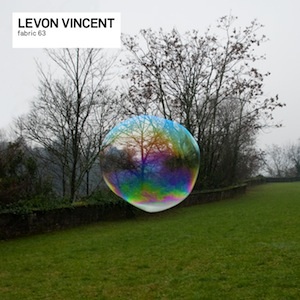Levon Vincent Fabric 63
“Most Europeans think ‘deep house’ means shitty, high-energy vocal house.” So goes the opening rant […]

“Most Europeans think ‘deep house’ means shitty, high-energy vocal house.” So goes the opening rant of DJ Sprinkles’ 2009 masterwork Midtown 120 Blues, where the artist arraigns New York’s house scene for exporting a commercial, all-frills product to the world, among other things. While Sprinkles’ work acted as a singular answer to NYC’s blighted deep-house sound, Fabric 63 serves to document the re-emergence of a credible scene in the city over the past decade.
Levon Vincent fled New York for Berlin several years ago, but he developed his now-renowned style in the city with fellow NYC-area veterans like DJ Jus-Ed, DJ Qu, Fred P, Anthony Parasole, and Joey Anderson. These five producers, plus Vincent (and JM De Frias, a NYC newcomer) supply all 15 tracks for Vincent’s Fabric 63 mix. While Vincent doesn’t take the route that Villalobos, Omar-S, and Shackleton famously chose for their all-solo Fabric mixes, his specific portrayal of a tight-knit scene’s sound offers a unique approach to the mix series.
Vincent paces his work elegantly by playing with tone color. Often, Fabric 63 feels like an indulgent techno mix, as Vincent spends minutes subtly blending gray, toneless tracks to the point where their assorted elements weave together anonymously. But these meticulous blocks are bookended by spurts of tonal brilliance, notably via the tinkering piano loop on JM De Frias’ “Intrinsic Motivation” and the funky, garage-house-on-its-head bassline that appears halfway through Vincent’s own “Fear.” The mix ranges from the whimsical to the brutally minimal, several times taking breaks from its colorful flutters by resting on simple transitions that consist entirely of a kick drum.
It’s not until the final lap of Fabric 63 that Vincent introduces perhaps the most talented of his NYC deep-house cohorts, Fred P (a.k.a. Black Jazz Consortium—who, incidentally, give us his own stellar mix last year). “Blacklight,” which dropped last year via P’s own Soul People Music imprint, kicks the mix into overdrive, sending hi-hats into double time and clearing a path for Vincent’s two most inspired productions, 2009’s “Early Reflections” and the unreleased “Rainstorm II,” both of which serve as centerpieces of this superb mix.
“Rainstorm II” is particularly exceptional. In addition to being a sequel of sorts to one of Vincent’s most-appreciated tracks, last year’s “Impressions on a Rainstorm,” the song also shares its name with a brand of air rifle. Perhaps it’s a coincidence, but Vincent leads into the track with “Early Reflections,” a tune that casually uses gunshot samples to help express its four-to-the-floor rhythm. For all of the dark, percussive squelches this 75-minute mix offers, the gunshots on “Reflections” are the most jarring and unprecedented timbres to be drawn. In case the mix’s minimalism lost your attention, the gunshots refocus it just in time for the startlingly melodic “Rainstorm II.” Anchored by a fuck-it-all Detroit synth lead and a mechanically funky bassline, the dazzling track is not only a success on Fabric 63, but also a step forward for Vincent as a producer, leading him into more three-dimensional territory.
Some of Fabric’s most successful mixes have ended with an emotive left turn, from the heart-rending inclusion of “Set It Out” on Omar-S’ Fabric 45 to the extended “Heartbit”/“Heartbeat” jam-out of Optimo’s Fabric 52. Vincent enters that pantheon by driving us off of the cliff that “Rainstorm II” climbed, directly mixing into Black Jazz Consortium’s beatless “Far Away (Atmospheric Pass).” In a recent interview, Vincent described how his Sundays were often spent in bed due to his ears tiring from long weekends at clubs. His choice in closing Fabric 63 seems to reflect the end of that weekly cycle, leaving us cathartic and disoriented after a successful journey into a brutally rewarding world of deep house.

